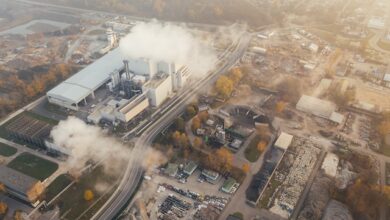Analyzing the Impact of Inflation on the American Economy, Top 9 Challenges Facing the US Job Market
Analyzing the Impact of Inflation on the American Economy, Top 9 Challenges Facing the US Job Market

Inflation is an economic phenomenon that affects everyone. It can cause prices to rise, the value of money to decline, and even impact the job market.
In recent years, inflation has been a hot topic in the American economy. With fears of rising costs and economic instability, it’s important to understand how inflation impacts our daily lives and what we can do about it.
In this blog post, we’ll analyze the impact of inflation on the American economy and explore the top 9 challenges facing the US job market today. So buckle up and let’s dive into this crucial topic!
What are the Economic Risks of Inflation?
Inflation is a phenomenon where the prices of goods and services rise over time, causing the value of money to decrease. While inflation can be beneficial for certain sectors such as real estate or stock markets, it poses significant economic risks that can have far-reaching consequences.
One risk associated with inflation is reduced purchasing power. As the value of money decreases, consumers are able to purchase fewer goods and services with their income. This reduction in purchasing power could lead to a decline in consumer spending, which in turn could trigger an economic recession.
Another risk is increased production costs. When prices rise due to inflation, businesses may need to increase wages or pay more for raw materials and other inputs. This increased cost of production could lead to lower profit margins or even business closures.
In addition, inflation can also result in higher interest rates as central banks aim to control rising prices by increasing borrowing costs. Higher interest rates make it more expensive for individuals and businesses alike to borrow money, which can slow down economic growth.
While some level of inflation is normal and expected in any economy, too much inflation can pose significant risks that must be addressed through effective policies and measures.

How is Inflation Affecting the American Economy?
Inflation is a phenomenon that affects not only individuals but also the entire economy. The American economy is no exception to this impact. When inflation occurs, it reduces the purchasing power of consumers and businesses alike. As a result, people end up buying less than what they used to for the same amount of money.
Moreover, inflation can lead to an increase in interest rates which means higher borrowing costs for businesses and consumers. This leads to decreased investment and spending which can slow down economic growth.
Inflation also impacts people’s expectations about future prices. If people believe that prices will continue to rise, they may buy more goods today before their price goes up even further. This results in increased demand which can drive up prices further and cause a vicious cycle of inflation.
Additionally, high levels of inflation can lead to currency devaluation since foreign investors may lose confidence in the currency’s value as its purchasing power decreases over time.
Therefore, it becomes essential for policymakers to balance economic growth with stable prices by implementing appropriate monetary policies such as controlling money supply or adjusting interest rates based on market conditions.

What are Some Solutions to Address These Challenges?
As inflation continues to impact the American economy, it’s important to look into solutions that can address these challenges. One solution is for the government to implement policies that support economic stability and growth.
This includes investing in infrastructure development, increasing access to education and training programs, and providing financial aid and support to small businesses.
Another potential solution is for individuals and businesses alike to adjust their spending habits in response to rising prices. This may mean cutting back on non-essential expenses or finding ways to save money through budgeting techniques.
Additionally, central banks can help combat inflation by adjusting interest rates. By raising interest rates, they can incentivize saving over spending which helps reduce demand for goods and services causing a decrease in price levels.
International cooperation among countries experiencing similar inflation issues could lead to more effective solutions being developed together such as trade agreements focused on reducing tariff barriers or harmonizing monetary policy across borders.
There are various ways in which we can address the challenges caused by inflation but it will require collaboration from all stakeholders including government officials, business leaders, economists, and individual citizens alike.

What are the Top 9 Challenges Facing the US Job Market?
The US job market is facing numerous challenges that have made it difficult for workers to find and maintain employment. One of the biggest issues is globalization, which has led to outsourcing of jobs and increased competition from foreign workers.
Another challenge facing the job market is automation, as technology continues to replace human labor in many fields. This has resulted in a decrease in demand for low-skilled jobs and an increase in demand for high-skilled workers who can operate and maintain these technologies.
The rise of the gig economy has also presented challenges to traditional employment models, with more workers opting for freelance or contract work instead of full-time positions.
This shift away from traditional employment structures has created uncertainty around worker protections such as benefits, wages, and job security.
Discrimination based on race, gender, age or other factors remains a significant barrier to equal opportunities within the job market. Many employers still exhibit bias towards certain groups of people when making hiring decisions despite laws against discrimination.
The lack of affordable education options has also led to difficulties finding adequate training for higher-paying jobs resulting in limited access to better paying careers .
Additionally, the cost-of-living typically exceeds minimum wage earnings leaving many working class at risk without financial stability
Finally ,the COVID-19 pandemic caused widespread unemployment across industries leading millions out of work further exacerbating economic inequality between rich & poor due to inadequate policies surrounding paid leave & hazard pay among others .
Addressing these challenges will require innovative solutions such as expanding educational opportunities accessible by all classes , implementing stronger anti-discrimination measures ensuring fair hiring practices,& increasing government support during times like pandemics where mass unemployment occurs..
FAQs
Q: What is inflation, and how does it affect the economy?
A: Inflation refers to an increase in prices over time, which can erode purchasing power and reduce economic growth. High levels of inflation can lead to higher interest rates, reduced investment, and slower economic activity.
Q: How does inflation impact consumers?
A: Inflation can cause consumers to pay more for goods and services, reducing their disposable income. This can lead to lower standards of living if wages do not keep up with rising prices.
Q: How does inflation impact businesses?
A: Businesses may face increased costs due to higher input prices such as raw materials or labor. They may also find it difficult to price their products competitively while maintaining profits in a high-inflation environment.
Q: What are some solutions for addressing inflation?
A: Governments often use monetary policy tools such as raising interest rates or adjusting the money supply to counteract high levels of inflation. Additionally, policies that promote productivity growth or target specific sectors experiencing price increases could help alleviate long-term structural issues.
Q: What are some challenges facing the US job market currently?
A: One major challenge is automation replacing jobs traditionally held by humans. The gig economy has also created new forms of employment that lack traditional benefits like healthcare coverage or retirement savings plans. Additionally, global competition has led many companies to outsource jobs overseas instead of hiring domestically.
Conclusion
Inflation can have a significant impact on the American economy and job market. It’s essential to understand the economic risks of inflation and how it affects businesses’ ability to invest in growth opportunities, hire more employees, and pay competitive wages.
The solutions to address these challenges may include implementing monetary policies that control inflation rates, investing in education and skills training programs for workers to increase their employability, supporting small businesses through tax incentives and access to capital resources.
Moreover, understanding the top 9 challenges facing the US job market is critical for policymakers when making decisions that affect labor markets.
Addressing these issues can help create an environment where people are better equipped with relevant skills needed by employers while ensuring that companies can thrive without compromising employee welfare.
We must work together as a nation towards building a resilient economy that benefits all citizens. By addressing these issues head-on with innovative strategies tailored towards both short-term recovery measures from COVID-19 pandemic shocks and long-term sustainable growth initiatives – we will be able to create stable jobs with decent wages while keeping inflation levels within manageable limits.



